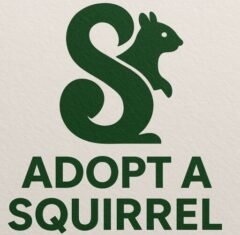5 Common Feeding Complications in Adopted Baby Squirrels
Feeding a baby squirrel may seem simple, but even small mistakes can lead to serious complications. As an adoptive squirrel parent, it’s important to understand the most common feeding issues and how to prevent them especially in the early stages of care.
This guide will walk you through five common feeding problems new squirrel parents might encounter, along with safe, practical tips to help keep your hand-raised baby squirrel healthy and thriving.
⚠️ This content is for educational purposes only. Always consult with an exotic pet veterinarian for medical advice related to your squirrel’s health.
1️⃣ Aspiration (Inhaling Formula)
What It Is:
Aspiration happens when formula enters your squirrel’s lungs instead of the stomach—usually due to incorrect feeding position or fast-flowing nipples. This can cause pneumonia and be life-threatening.
Symptoms:
- Bubbles from the nose or mouth
- Wheezing, clicking sounds, or labored breathing
- Open-mouth breathing
- Lethargy or refusing food
Prevention Tips:
- Always feed in an upright position never on the back
- Use a syringe with a nipple that drips, not pours, when turned upside down
- Feed slowly, allowing the baby to swallow naturally
- Keep feeding sessions quiet, warm, and distraction-free
What to Do If It Happens:
- Gently tilt the baby face-down and support its body to help drain any fluid
- Wipe the nose and mouth with a clean cloth
- Watch closely if symptoms persist, contact a vet immediately
2️⃣ Bloat
What It Is:
Bloat occurs when gas builds up in the stomach and intestines. It’s often caused by overfeeding, feeding a cold baby, or using the wrong formula.
Symptoms:
- Swollen, firm belly
- Discomfort or refusal to eat
- Lethargy or squeaking when touched
Prevention Tips:
- Never feed a cold squirrel always warm the baby first
- Feed no more than 5% of the baby’s body weight per meal
- Use only approved formulas like Fox Valley Day One
- Avoid cow’s milk, juice, baby food, or sugary drinks
Treatment:
- Switch temporarily to unflavored Pedialyte
- Administer infant gas drops (simethicone)
- Gently massage the belly while keeping the squirrel warm
- If symptoms last more than 12 hours, seek veterinary advice
3️⃣ Diarrhea
What It Is:
Runny or foul-smelling stool often signals an imbalance in the digestive system due to incorrect formula, poor transition between formulas, or overfeeding.
Symptoms:
- Loose, watery, or sticky stool
- Sour or unusually strong smell
- Soreness or redness around the bottom
Prevention Tips:
- Follow formula mixing instructions exactly
- Transition between formula types gradually, over 1–2 days
- Stick to consistent feeding intervals avoid “topping off”
Treatment:
- Temporarily feed Pedialyte or lactated ringers
- Add a probiotic like acidophilus powder to help restore gut health
- Resume formula after 1–2 hydration feedings
- Clean the baby gently with fragrance-free baby wipes
4️⃣ Dehydration
What It Is:
Young squirrels dehydrate quickly, especially if they’ve been without warmth or food for a few hours. Proper hydration is critical for digestion and temperature regulation.
Symptoms:
- Dry, wrinkled skin
- Sunken eyes or dry mouth
- Pale gums or lethargy
- Hard, dark, or no stool
Prevention Tips:
- Always check hydration status before feeding
- Offer Pedialyte or vet-approved hydration fluids when needed
- Keep your squirrel warm and stress-free during feedings
Rehydration Tip:
Try gently pinching the skin between the shoulder blades if it stays tented or slow to return, your baby needs fluids ASAP.
5️⃣ Genital Nursing (Self or Littermate Injury)
What It Is:
Baby squirrels especially males may suckle on their own genitals or those of siblings, mistaking them for nipples. This is not sexual behavior but a result of hunger or stress.
Symptoms:
- Red, swollen, or elongated genitals
- Scabbing or dark purple sores
- Difficulty urinating or straining
- Discharge or foul smell
Prevention Tips:
- Feed babies frequently and with proper formula
- Check genitals at every feeding
- Separate squirrels showing signs of excessive nursing
Treatment:
- Soften and remove scabs gently with a warm compress
- Apply Neo PolyDex (not Neosporin if the squirrel is licking the wound)
- Use an anti-lick gel like YUK around the area
- Contact a vet immediately if the baby cannot urinate for 12–24 hours
Final Tips for Healthy Feeding
- Stick to a consistent feeding schedule
- Keep your baby’s feeding area clean, warm, and quiet
- Watch for any changes in stool, energy level, or appetite
- Use only formulas and supplies recommended for squirrels
- Keep a feeding and weight chart for the first few weeks
